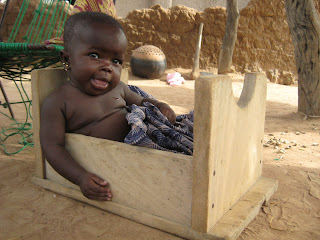
This is the health center. To the right is the maternity wing and the left is an operating room and the doctor's office. The vaccinations and weighing take place outside in the middle of the hangar.

In a village about three miles from mine there is a health center and a mayor's office that serves the needs of 27 surrounding villages, each at least 1,000 people in population. On Tuesdays from 8-whenever the work is done, the doctor there vaccinates babies and I come to weigh them after they're vaccinated since there are too many women and not enough time for the doctor to do both. It's a great way for the women in the villages around mine to get a look at me and to know me a little so if we want to do projects together I'm not totally foreign to them. I also relish the chance to hold sweet babies who aren't old enough to recognize I'm a foreigner and so don't start crying just because I'm white (which happens often with children ages 2-7).
By the time the vaccinations start there are at least 30 women waiting and they continue to arrive throughout the day. I keep a tally of the babies I weigh (at the doctor's request) and last week 75 women came between 8:00 - 3:00 to get their baby's first shots and a dose of vitamin A. Women walk for at least an hour, and in the case of my village, an hour and a half, to get this vaccination and as I look around while I wait for the next baby to weigh my heart feels heavy inside knowing they have another long walk home in the heat of the day with a hungry belly after the shots are done. They can't just bring a snack pack along with them to eat - all their food is cooked on a large scale and doesn't travel well so there isn't another option. None of the women complain about the long wait, long walk and eating late. I'm struck by the power of women and mothers because I know that all of these things affect them. I'm hungry and tired and I eat a full meal before coming and have a bike which speeds up my travel time so I know they must be too.
A friend asked if malnourishment is a problem where I live and the short and simple answer is "Yes" though it's not strikingly apparent. While I imagined hunger to be emaciated children with protruding bellies, the results where I am are more subtle. Most of the babies I encounter are fat and smiling but they are all still breast-feeding. Once the breast-feeding stops the effects of hunger become more apparent. Some children's hair gets a yellow-orange shade and I know there are extended bellies hiding underneath their t-shirts when children get their nightly bath in the compound. By the time they're 8 or 9 years old, the hair returns to a normal black and the bellies retract but their diets don't change so the malnourishment remains.
It's hard looking around me and feeling helpless in the face of such a big problem. While it would be easy to just buy food to give away, what would happen when I left? As I struggle with how I can be a vehicle for positive change during my time here the word "sustainable" becomes more and more a part of my internal dialogue. I've reached no neat conclusions to this messy problem but am hoping that further discussions with fellow villagers will produce some answers and together we'll be able to at least shake a stick at hunger and malnourishment.

No comments:
Post a Comment